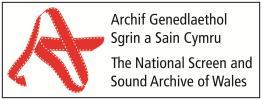National Screen and Sound Archive of Wales preserves and celebrates the sound and moving image heritage of Wales, making it accessible to a wide range of users for enjoyment and learning. Its film collection reflects every aspect of the nation’s social, cultural and working life across the 20th century, giving a fascinating insight into Welsh filmmaking, both amateur and professional.
This film is currently unavailable

Cocos a Chwrwglau
Cockle women and coraclemen: women of Penclawdd, Gower, collect and sell fresh cockles (‘cocos’) and men on the River Teifi or Tywi paddle and repair coracles (‘cwrwglau’).
From the collection of:

Overview
Cockles and coracles, each with a long history in Wales. At Penclawdd, Gower, women (mainly) rake and sieve the sands to collect the hidden cockles, as has been the practice since at least the days of the Romans. Transported by donkey, the cockles are sold to eager customers, once washed and cooked. On the river Teifi or Tywi, a man paddles his coracle (using the easy-to-watch but hard-to-master figure-of-eight technique) and another repairs his coracle’s damaged skin.
The women gathering cockles are working the rich mud flats of the Burry Inlet, the estuary of the River Loughor. Tractors have taken the place of donkeys but all gathering is still done by hand (using the same tools – scraper, rake and sieve) and under license, a law of 1965 safeguarding the historic trade. Coracles, too, are licensed and two working together, with a net between, are used to catch salmon or sewin. They can still be seen on the Teifi, the Tywi and the Taf rivers but, in the past, were used as ferries on the River Severn and were also present on the River Dee, around Llangollen. This film is a compilation created by the pioneer of Welsh language films, Ifan ab Owen Edwards.
Related

New Perspectives: La Haine New Perspectives: La Haine
Short documentary 2025 4 mins
Charlie Hammersley, a student from Northumbria University, explains how Mathieu Kassovitz's 1995 film holds up a mirror to society.

Dreamers Q&A Dreamers Q&A
Inside Film 2025 30 mins
The film-makers behind a haunting tale of love and community within a UK immigration detention centre visited the BFI Southbank to discuss their film.

Paul Thomas Anderson and Leonardo DiCaprio in Conversation Paul Thomas Anderson and Leonardo DiCaprio in Conversation
Inside Film 2025 50 mins
Paul Thomas Anderson and Leonardo DiCaprio in Conversation at BFI Southbank, discussing the making of One Battle After Another.

Laura Mulvey in Conversation Laura Mulvey in Conversation
Inside Film 2025 76 mins
Laura Mulvey in conversation, following her BFI Fellowship Award.

George Clooney in Conversation George Clooney in Conversation
Inside Film 2025 74 mins
George Clooney visited BFI Southbank to look back on his life and career.

Chloé Zhao Screen Talk | BFI London Film Festival 2025 Chloé Zhao Screen Talk | BFI London Film Festival 2025
Inside Film 2025 65 mins
The Oscar®- winning director of Nomadland discusses her unique approach to filmmaking and the inspiration behind the adaptation of Hamnet.